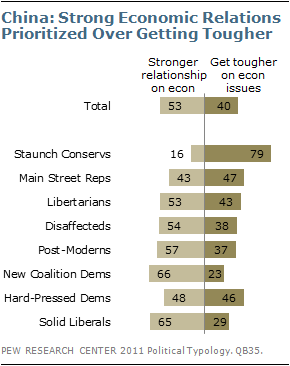As often as I repeat and document (here, for example) the fact that real incomes for middle- and low-income Americans plateaued in February 1973 (and incomes for middle- and low-income families and households before the end of the 1970s), I’m still puzzled as to why that happened. Rick Perlstein offers an explanation in today’s NYT.
His narrative seems to be that in the 1970s, after the shellacking of George McGovern by Nixon in 1972 and the re-writing of the Democratic delegate selection process that gave Carter the nomination in 1976, liberalism in the Democratic Party changed its agenda. It became less about the bread and butter issues of economic security and shared prosperity and more about civil rights, the environment, getting out of Vietnam, and honest and transparent government. The Humphrey-Hawkins legislation in 1978, which nominally requires the Fed to keep both inflation and unemployment low, was so watered down that the Fed has never let itself be influenced in the slightest by the unemployment half of the mandate. Humphrey-Hawkins, like Pickett’s Charge, marks the end of an era instead of a consolidation of gains.
It has seemed to me unlikely that we would ever find a single event, policy change, or market shift that explains the persistent stagnation of real middle and low incomes starting in the 1970s. If there had been such an occurrence, surely it would have become obvious by now, wouldn't it? Still Perlstein’s explanation—that there was a great political realignment and all of the endless string of tactical defeats for America’s middle and lower class incomes flow from that—seems rather plausible to me. One reason it seems plausible is that it’s a fair description of my own attitudes as a life-long Democrat. I was not friendly to labor unions but saw them as more powerful than they needed to be, corrupt, bigoted, and on the wrong side about Vietnam, the environment, and civil rights. I was a “business Democrat,” then a wary DLC follower, a New Democrat, and even a supporter of Pete Peterson's Concord Coalition. In short, I was a part of the wing of the Democratic Party that took over. I regret now what we did to the rest of America.
In addition to these changes in the Democratic Party, I would think that the August 1971 Powell Memo to the US Chamber of Commerce and how big business and conservatives reacted to that was also very important. They organized a generations-long ideological fight using think tanks, media control, curriculum influence, campaign finance, etc., and the opposition was never organized and to a shocking degree didn’t notice there was a game on.
What do you think blew up the American Dream?
Update on Saturday, May 28, 2011 at 03:15PM by
 Skeptic
Skeptic
My comment here may also have been influenced by this Yves Smith post a month ago. She has good quotes from Robert Scheer, The New Corporate World Order, a David Runciman review of Jacob Hacker and Paul Pierson, Winner-Take-All Politics, her own book, Econned, and other sources. They say, essentially, that it all started in the Carter Administration when the Right pushed and didn't meet much resistance--the tide was already ebbing for the middle class before the elections of Thatcher and Reagan.
Update on Monday, May 30, 2011 at 01:43PM by
 Skeptic
Skeptic
Steve and Mike in comments focus on advancing technology deployment as eliminating jobs. No doubt in my mind that that’s true, but until 2000 whatever jobs were eliminated were more than replaced by other jobs in America. The employment to population ratio had its most rapid growth ever from about 1975 to 2000.

The conventional wisdom is that increasing use of technology requires better trained workers, who should theoretically be paid more than the less skilled workers displaced by the technology. The only time after 1973 we saw that effect was during the dot-com boom. At all other times the presumed upward pressure on wages from increasing skill requirements was overwhelmed by other factors pressing wages down.
Since the hit to wages came a quarter century before the hit to employment and wages generally trended down instead of up while employment was growing, it doesn’t seem to me that the advancing technology factor is an obvious cause of 38 years of wage stagnation.
 Skeptic
Skeptic

